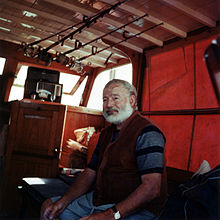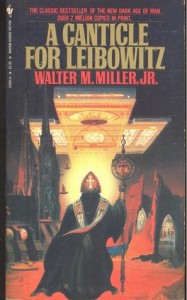Hemingway family mental illness explored in new film

(Source: Wikipedia)
Ernest Hemingway, who won the Nobel Prize in Literature in 1954, struggled with depression throughout his life before committing suicide in 1961. In this article from CNN, his gradddaughter, Mariel Hemingway, discusses a new documentary about the family that she hopes will increase awareness of and allow people to talk more openly about mental illness.
Libraries: Good Value, Lousy Marketing
Publishers Weekly has a good summary of the results of a recent Pew study, Library Services in the Digital Age.
The key finding:
libraries—in the opinion of most Americans—aren’t just about books. 80% of U.S. residents say that lending books is a “very important” service, but they rate the help they get from reference librarians as equally important. And nearly the same number, 77%, reported that free access to technology and the Internet is also very important. This triumvirate—books, help, and technology—runs through the entire report.
Also:
Clearly, American library users wanted it all: a beautiful well-stocked place, perfect for browsing and sipping, reading and listening. And a humming web site, accessible from your handheld device, offering an array of content plus direct, one-on-one services.
Find the entire Pew report here.
50 Essential Science Fiction Books
 Richard Davies admits that he faced a nearly impossible task: “Put together a list of 50 must-read science fiction books and don’t make anyone angry.”
Richard Davies admits that he faced a nearly impossible task: “Put together a list of 50 must-read science fiction books and don’t make anyone angry.”
Here are the criteria he used in paring down the huge genre of science fiction to a mere 50:
One book per author, so that was hard on the big three of science fiction – Robert Heinlein, Isaac Asimov and Arthur C Clarke, who each have multiple classic titles to their name. Attempt to show as many sub-genres of science fiction and plot themes as possible. Include early stories that influenced the genre as a whole and launched popular themes, even if those books appear a bit dated today.
I don’t read much science fiction, so I wasn’t too surprised when I counted only 6 of these books as ones I’ve read. However, the list did motivate me to dig my mass market paperback of Canticle for Leibowitz out of the back row on my TBR shelf. I’ve placed it in a more prominent position so that now I may actually get around to reading it.
What about you? How many of these science fiction classics have you read?
The Many Lives of Donald Westlake
The release of the film Flashfire, featuring Parker, the antihero created by Donald Westlake under the pseudonym Richard Stark, has prompted Michael Weinreb to write a retrospective about Westlake, who died in 2008.
I bring up Westlake now because this Friday, a filmic version of a Parker novel called Flashfire will be released to theaters. It is not the first iteration of Parker on celluloid, and it will not be the last, though it is the first to bear the actual name of the character, since the producers have secured options on several of the books. In the past, Parker has been called Porter and Walker and Stone and Macklin, and he has been played by Lee Marvin and Jim Brown and Robert Duvall and Peter Coyote and Mel Gibson and a French actress named Anna Karina. In this version, he is played by Jason Statham and directed by Taylor Hackford, and while I have not seen it, I have heard — both from Westlake’s widow, Abby Adams, and his close friend, the writer Lawrence Block — that it stays relatively true to the Parker character as Westlake conceived him.
Weinreb explains that once, when writing a Parker novel, Westlake had a problem: The story kept turning out funny. And so was born Westlake’s more adorable character, John Dortmunder:
Westlake rewrote that failing Parker novel with a new brand of antihero, a put-upon thief named Dortmunder. He called it The Hot Rock, and it was made into a (very good) movie, scripted by William Goldman and starring Robert Redford. For the remainder of Westlake’s career, Dortmunder became the flip side of Parker, a man who can’t seem to catch a break, a man whose very human — whose very Westlakeian — neuroses set him back time and again. The natural connection between Dortmunder and Parker is that they are both men at work, and they are both at the mercy of forces they cannot control; the natural connection, I think, is that Dortmunder and Parker represent the two sides of the writer’s life, both the whimsy and the grind.
Desecrating Poe
Laura Miller of Salon takes on the new Fox thriller, The Following, which features Kevin Bacon as a former FBI agent called out of retirement to track the proteges of Joe Carroll, a serial killer whose crimes are based on the works of Edgar Allan Poe:
The horror of “The Following” comes not just from the storytelling, but from the way it maligns a literary legacy

As always, Miller tells us how she really feels:
Poe may be the father of American horror fiction, but he would surely protest at being implicated in this feeble, derivative, dishonest tripe. “The Following” presents an image of his literary intentions and methods that could not be more wrong. While some of Poe’s characters are indeed insane, he did not equate insanity with “art.” To the contrary, “The Philosophy of Composition,” Poe’s famous essay on how he wrote “The Raven,” promises to demonstrate the supreme rationality of his creative process. He avows that “no one point in [‘The Raven’s’] composition is referable either to accident or intuition — that the work proceeded, step by step, to its completion with the precision and rigid consequence of a mathematical problem.” And, believe me, he shows his work. Sure, the essay suggests a certain amount of OCD, but nothing that remotely resembles the sociopathic, homicidal ecstasy evinced by Carroll.
I haven’t watched the series yet. I prefer to collect a few episodes of a new series on the DVR and then watch them all at once to see how the story progresses (or, sometimes, doesn’t progress). How about you? Have you seen this new show? Tell us what you think in the comments.
